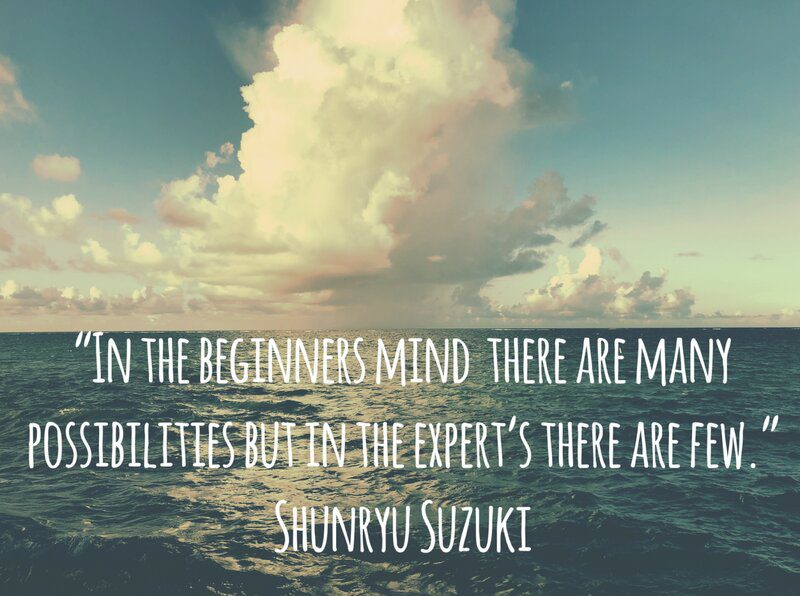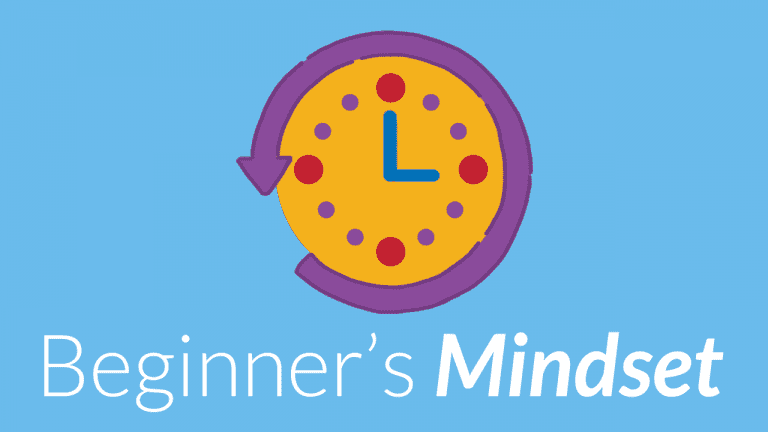“In the beginner’s mind there are many possibilities, in the expert’s mind there are few.”
In Zen Buddhism, the beginner’s mind is called Shoshin (初心). It refers to the idea of letting go of your preconceptions and developing an attitude of openness and eagerness when studying a subject, even when studying at an advanced level, With this approach to study, we can grow and learn faster.
Zen monk and teacher Shunryu Suzuki, In his great book Zen Mind, Beginner’s Mind: Informal Talks on Zen Meditation and Practice, shares some great insights on the beginner’s mind:
In Japan, we have the phrase shoshin, which means “beginner’s mind.” The goal of practice is always to keep our beginner’s mind. Suppose you recite the Prajna Paramita Sutra only once. It might be a very good recitation. But what would happen to you if you recited it twice, three times, four times, or more? You might easily lose your original attitude towards it. The same thing will happen in your other Zen practices. For a while you will keep your beginner’s mind, but if you continue to practice one, two, three years or more, although you may improve some, you are liable to lose the limitless meaning of original mind.
For Zen students the most important thing is not to be dualistic. Our “original mind” includes everything within itself. It is always rich and sufficient within itself. You should not lose your self-sufficient state of mind. This does not mean a closed mind, but actually an empty mind and a ready mind. If your mind is empty, it is always ready for anything; it is open to everything. In the beginner’s mind there are many possibilities; in the expert’s mind there are few.
If you discriminate too much, you limit yourself. If you are too demanding or too greedy, your mind is not rich and self-sufficient. If we lose our original self-sufficient mind, we will lose all precepts. When your mind becomes demanding, when you long for something, you will end up violating your own precepts: not to tell lies, not to steal, not to kill, not to be immoral, and so forth. If you keep your original mind, the precepts will keep themselves
In the beginner’s mind there is no thought, “I have attained something.” All self-centered thoughts limit our vast mind. When we have no thought of achievement, no thought of self, we are true beginners. Then we can really learn something. The beginner’s mind is the mind of compassion. When our mind is compassionate, it is boundless.

The Earned Dogmatism Hypothesis
In an article that appeared in the Journal of Experimental Social Psychology Volume 61, November 2015, Pages 131-13, titled: “When self-perceptions of expertise increase closed-minded cognition: The earned dogmatism effect” by VictorOttati et al. The Researchers writes:
Although cultural values generally prescribe open-mindedness, open-minded cognition systematically varies across individuals and situations. According to the Earned Dogmatism Hypothesis, social norms dictate that experts are entitled to adopt a relatively dogmatic, closed-minded orientation. As a consequence, situations that engender self-perceptions of high expertise elicit a more closed-minded cognitive style. These predictions are confirmed in six experiments.
Although cultural norms place a positive value on open-mindedness, open-minded cognition varies across individuals and situations (Ottati et al., 2015). For example, closed-mindedness is associated with a predisposition to experience psychological insecurity, and increases when individuals encounter morally objectionable viewpoints (e.g., communications advocating discrimination; Ottati et al., 2015).
In examining the determinants of open-minded cognition, the present paper focuses on self-perceptions of expertise. “Expert” designates someone who is relatively knowledgeable within
a domain. “Novice” designates someone who possesses a limited amount of knowledge (Delli Carpini & Keeter, 1992).
Individuals induced to believe they are experts tend to overestimate the accuracy of their beliefs. The Earned Dogmatism Hypothesis proposes that this finding arises, in part, because social norms entitle experts to adopt a more dogmatic cognitive orientation. Because experts have already given extensive thought to issues within a domain, they have “earned” the privilege of harboring more dogmatic opinions and beliefs. In contrast, social norms discourage individuals from being dogmatic when they possess a limited amount of knowledge. Expression of dogmatic convictions can be viewed as warranted, justified, or appropriate when the communicator possesses high expertise. This is less likely to be true when the communicator knows little about a topic. Social norms dictate that novices should adopt a more open-minded orientation.
For example, self-perception of expertise (“I am knowledgeable”) may possess an affective component (“I feel powerful”). These cognitive and affective components of expertise might cause individuals to feel normatively entitled to formulate strong opinions that are defended in a dogmatic fashion. Consistent with the Earned Dogmatism Hypothesis, this interpretation presumes that the effect of expertise on open-minded cognition is mediated by normative entitlement.
Developing a Beginner’s Mindset
- Open Mindedness
Have an open mind to other suggestions and ideas that might not be close to your previous way of looking at things, empty your mind of preconceived notions and ideas. According to Shunryu Suzuki:
“When you listen to someone, you should give up all your preconceived ideas and your subjective opinions; you should just listen to him, just observe what his way is. We put very little emphasis on right and wrong or good and bad. We just see things as they are with him, and accept them. This is how we communicate with each other. Usually when you listen to some statement, you hear it as a kind of echo of yourself.
You are actually listening to your own opinion. If it agrees with your opinion you may accept it, but if it does not, you will reject it or you may not even really hear it. That is one danger when you listen to someone. The other danger is to be caught by the statement. If you do not understand your master’s statement in its true sense, you will easily be caught by something which is involved in your subjective opinion, or by some particular way the statement is expressed. You will take what he says only as a statement, without understanding the spirit behind the words. This kind of danger is always there.
- Live without Shoulds
Try to live without the should and must of life, when we think of how things should/must be done a certain way, we remove a wide array of options. To the beginner, there are no should just coulds as they open limitless opportunities. - Don’t be an Expert
Let go of the idea of becoming an expert, have a beginner’s mind, and explore the field from different angles like a beginner would. - Focus on questions, not answers
Asking new questions that you do not have answers to, can give you a new perspective on things you already know. As René Descartes once quipped “I think, therefore I am”. He asserted that the very act of doubting one’s own existence served- at minimum – as proof of the reality of one’s own mind; there must be a thinking entity- in the case of the self – for there to be a thought.
“Look for people who have lots of great questions. Smart people are the ones who ask the most thoughtful questions, as opposed to thinking they have all the answers. Great questions are a much better indicator of future success than great answers.”― Ray Dalio, Principles: Life and Work
Having a beginner’s mindset is one of the essential skills needed to become a life-long learner because the more you know, the more you know you do not know. When most of us are studying, we do not have a beginner’s mindset; hence we are always looking for information to validate our present behavior and worldview.
All the best in your quest to get better. Don’t Settle: Live with Passion.



Comments are closed.